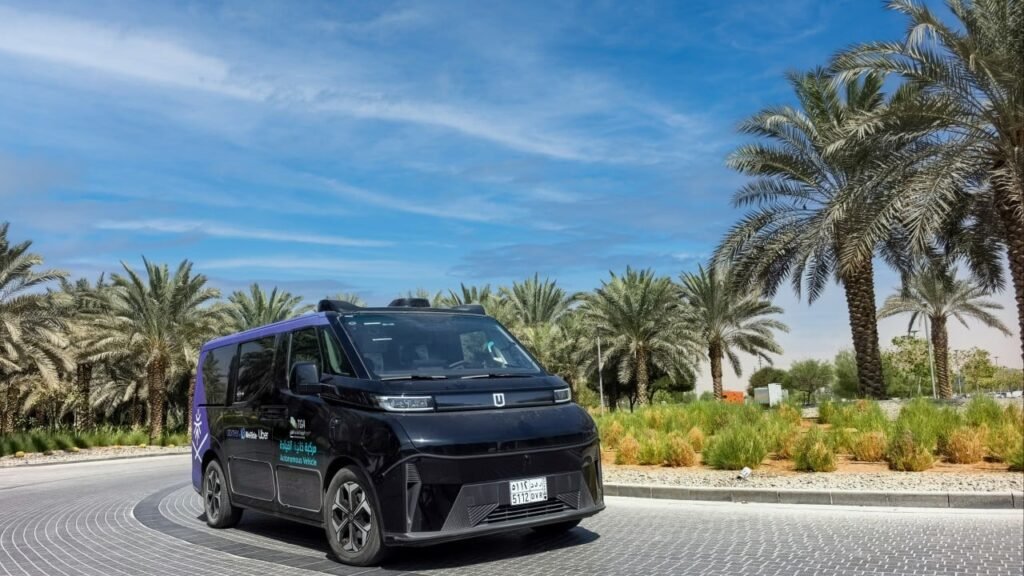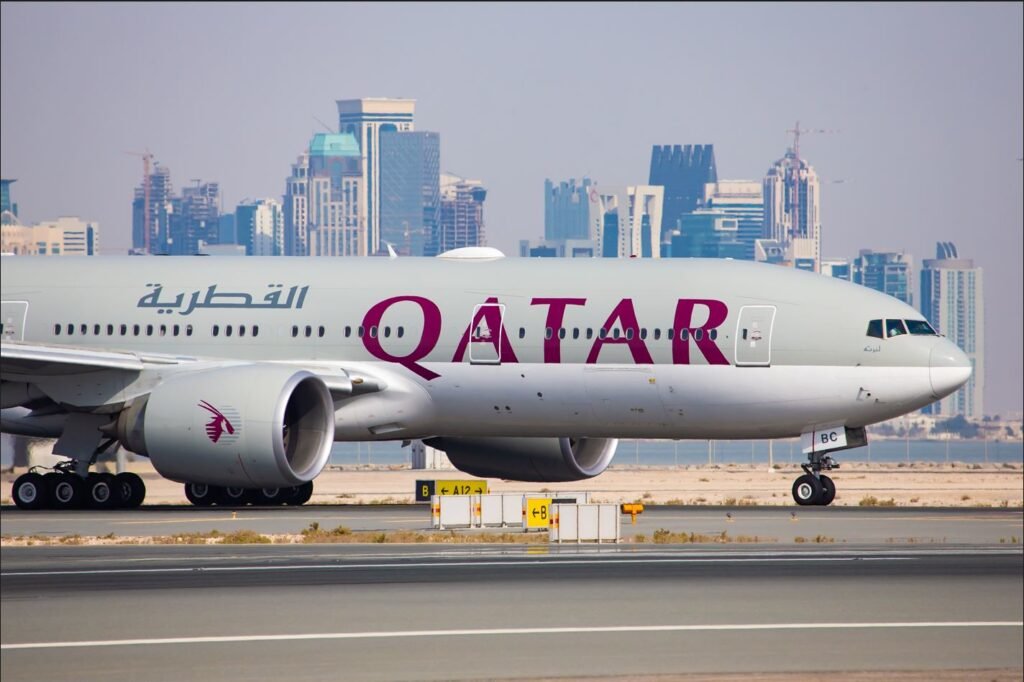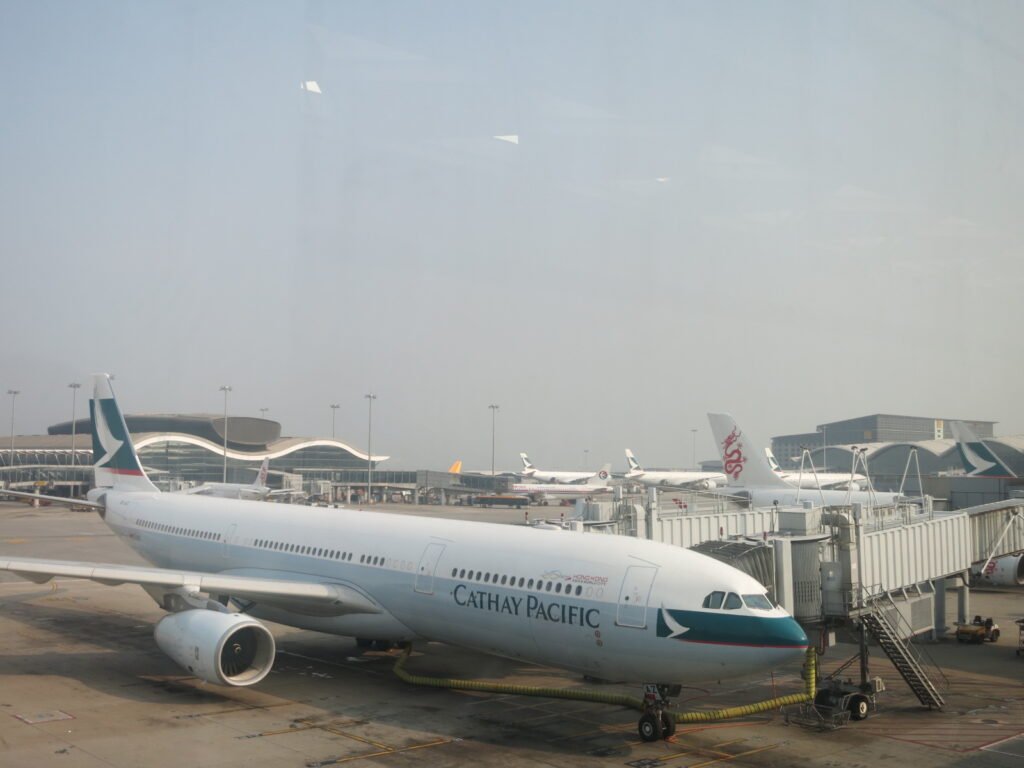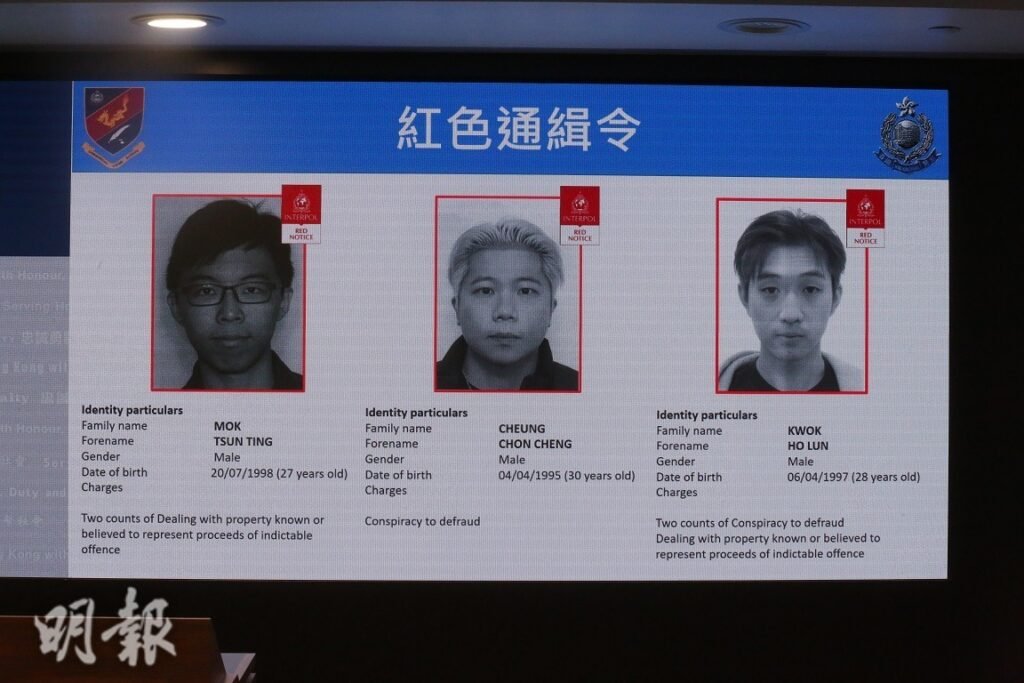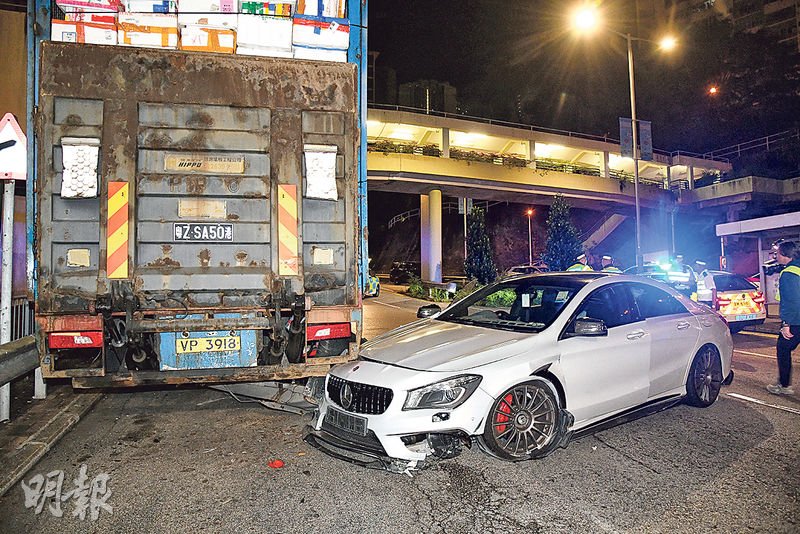Shares of WeRide start trading on Hong Kong’s stock exchange today, just over a year after the robotaxi firm forayed into U.S. markets with a Nasdaq listing. For CEO and founder Tony Han, the offering is part of a global strategy to fund the expensive but necessary research behind the company’s autonomous-driving tech.
WeRide’s shares are now listed on both the Nasdaq and the Hong Kong Stock Exchange. WeRide elected for a dual primary listing, which will allow mainland Chinese investors to buy the stock through the city’s Southbound Stock Connect scheme.
“We want to make our stock more accessible to investors all over the world,” Han told Fortune in late October, on the sidelines of the Fortune Global Forum. “China is a very important market, both for consumers and also for investors. A Hong Kong dual listing actually helps some potential investors who can only invest in the Hong Kong stock market to buy our stock.”
Han says the funds raised through the Hong Kong listing will help the robotaxi firm continue to spend on R&D and deployment. “We will still need to raise more funds,” he said, “so this will put WeRide in a much better position to access more funds.”
Fellow robotaxi firm Pony AI also starts trading in Hong Kong today after its own IPO on that exchange. Like WeRide, Pony AI listed on the Nasdaq late last year.
Hong Kong’s IPO market is booming as Chinese firms hope to leverage the city’s access to both international and mainland Chinese capital. Firms listed in mainland China, including home appliance manufacturer Midea and battery-maker CATL, have launched secondary listings in Hong Kong in order to draw international investment.
Yet several U.S.-listed Chinese companies are also considering primary listings in Hong Kong in order to access mainland Chinese investors. There’s also a geopolitical dimension: U.S.-listed Chinese firms may see Hong Kong as a backup in the event the Trump administration decides to delist them from U.S. exchanges, as part of a years-long dispute between Washington and Beijing over auditing standards.
The city’s Southbound Stock Connect scheme allows certified investors in mainland China to buy stocks listed in Hong Kong. Southbound flows hit a record $110 billion in the first seven months of the year, according to the South China Morning Post citing data from Wind, already greater than the entire total in 2024.
Investors are flocking to AI firms and “new consumption”—think Pop Mart and Labubu. Hong Kong’s benchmark Hang Seng Index is up around 32% for the year so far; by comparison, the Nasdaq Golden Dragon index, which tracks U.S.-listed Chinese companies, is up 22%.
WeRide raised $308 million in its Hong Kong IPO, Bloomberg reported Tuesday. Shares were priced at 27.10 Hong Kong dollars, a slight discount to the stock’s Nasdaq price at Monday’s close.
WeRide HK-listed shares fell almost 12% on their first day of Hong Kong trading; the firm’s shares have lost over 40% of their value since the U.S. IPO. Pony AI’s HK shares fell around 14%.
Self-driving cars: A social good?
Tony Han, formerly the chief scientist at Baidu’s autonomous vehicle unit, founded WeRide in 2017. Based in Guangzhou, the self-driving vehicle company operates in several major Chinese cities, as well as markets outside of China. The company has pilot programs in Singapore, France, Spain, Saudi Arabia and the United Arab Emirates, among others. As of November, WeRide is now testing or operating vehicles in 30 cities across 10 countries.
WeRide is a member of this year’s Future 50, Fortune’s annual ranking of companies with the greatest potential for growth. The firm is also a member of this year’s Change the World list, which highlights companies that are doing social good through their business models.
Han evangelizes the many ways that self-driving vehicles—and moving away from a car-centric culture—can improve society. He predicts that accident rates will be “drastically reduced” once cars are put in the hands of computers as opposed to humans.
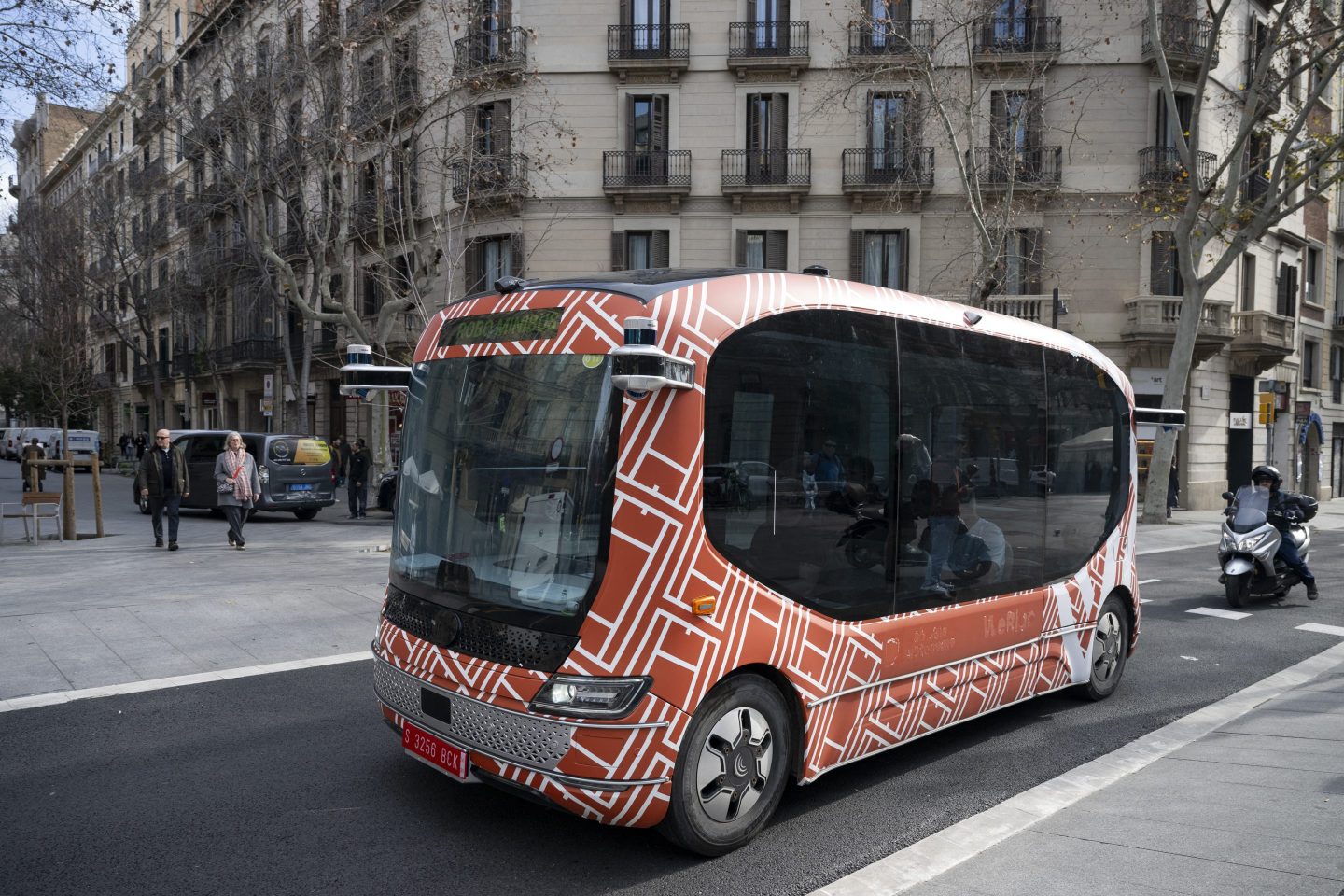
Josep Lago—AFP via Getty Images
“Most accidents, we find, are due to human factors,” Han explained, citing the effects of drinking, drowsiness, and distractions on human drivers. “Machines won’t be drunk, won’t overdose. Machines are very reliable. Fatal accident rates for robotaxis are much lower than human drivers.”
Less congestion could be another benefit of automated vehicles. “Robotaxis will never speed, will never just cut in line,” he said. “Traffic will just flow much more smoothly.”
There’s a broader economic argument for self-driving cars in countries whose populations are rapidly aging as birth rates decline—a particularly thorny problem in China and elsewhere in Asia. “With such huge markets, we will need lots of labor in transport and mobility,” Han said. “If we are short-handed, then we have to use AI to replace the shortage, to fill the gap between demand and requirements.”
That extends to public transport and public services. WeRide runs robobuses, robosweepers, and other automated forms of public transit and city vehicles. “The cost of bus drivers in a developed economy is quite high,” Han explained. If these costs can be reduced through automation, he argued, then cities can expand their transit systems and “help build more eco-friendly transportation for the whole planet.”
The robotaxi business
WeRide reported $27.9 million in revenue for the first six months of 2025, a 32% jump from the same period a year earlier. Still, the company reported a $110 million net loss for that same period, due in large part to spending of $90 million on research and development, approaching the $107 million spent on R&D for all of 2024.
Robotaxis remain an expensive and unprofitable proposition. An HSBC report in July pointed out that self-driving cars have a lot of hidden costs, including remote supervisors, charging and parking infrastructure, and tech support. The bank suggested that robotaxis might not break even until about eight years after launch.
Yet HSBC also predicted that robotaxis will likely reach their commercial potential in China first, due to greater adoption and acceptance of robotaxi technologies.
Chinese companies are leading the global push for robotaxis. In addition to WeRide and Pony AI, Baidu is also expanding its robotaxi offerings through its Apollo Go vehicles.
China also manufactures many of the components that go into self-driving cars. One key component producer is Hesai Technology, the world’s leading producer of automotive lidar sensors, which are used by robotaxis and other autonomous vehicles to recognize their environment and avoid obstacles.
Global ride-share companies are taking notice. WeRide is offering its Middle Eastern robotaxis through a partnership with Uber. Singaporean ride-hailing firm Grab has also made a strategic equity investment in WeRide, and is working with the Chinese firm to offer robobuses in Singapore starting next year.
Singaporean transit company ComfortDelGro, meanwhile, is working with Pony AI to explore offering robotaxis, while Lyft is collaborating with Baidu to test its Apollo Go self-driving cars in Europe.
By comparison, U.S.-based robotaxi operations are proving to be a lot slower in global expansion. Waymo currently operates in Tokyo and London.
Han isn’t surprised that global firms are now embracing Chinese robotaxis. After all, if China offers the best product, why wouldn’t foreign firms want to cooperate with it?
“When I was a teenager, we bought electronics from Japan, tools from Germany and computers from the U.S. It’s very normal. It’s very normal,” Han said.
“If WeRide can supply good robotaxi technology and services to Uber, and in turn, Uber and WeRide together bring a very efficient and comfortable taxi service to ordinary people; why shouldn’t we do that?”
Fortune is hosting the Fortune Innovation Forum in Kuala Lumpur, Malaysia from Nov. 17-18. Join business leaders and policymakers as they discuss opportunities and strategies for a world marked by AI, protectionism, and geopolitical tensions. Register here!


